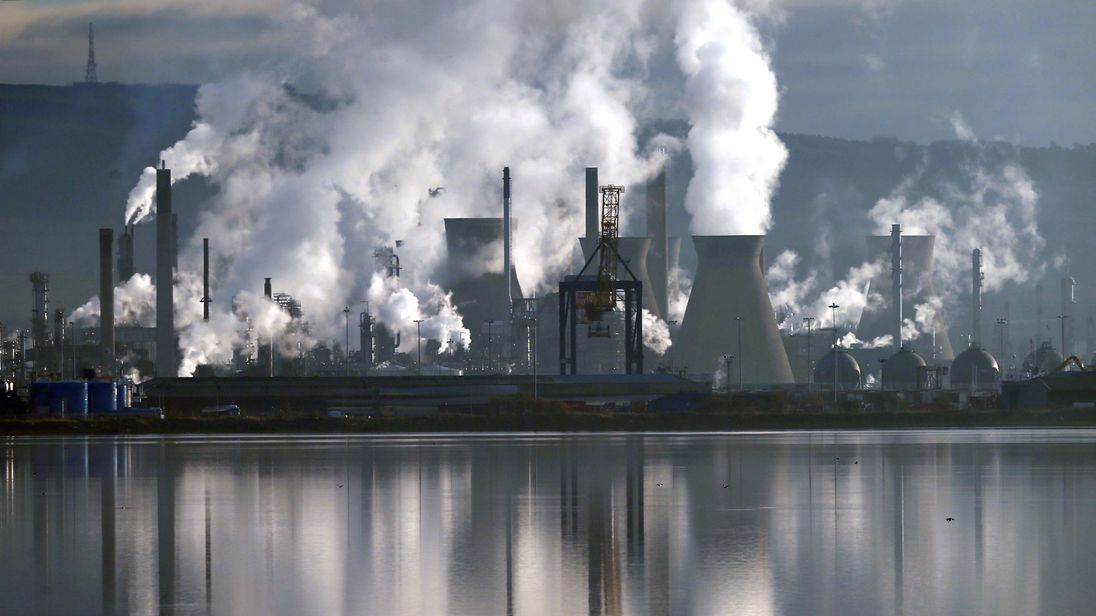For the first time, Scotland has a carbon budget under the international climate agreement made in Paris in 2015.
A new report by experts from the Tyndall Centre for Climate Change Research at the University of Manchester and Uppsala University in Sweden concludes that for Scotland to meet its global responsibilities it can only emit a total of 300 million tonnes more carbon dioxide – meaning it has to cut emissions by at least ten per cent every year starting now.
According to the pollution database maintained by the Scottish Environment Protection Agency (SEPA), 12 of the top 20 carbon polluters are linked to North Sea oil and gas. In 2016 they emitted a total of over six million tons of carbon dioxide. See details of the top 20 pollouters on this map:
Changing Industry
This is the first time experts have calculated the precise figure of carbon Scotland can (and cannot) produce to keep in accord with the Paris agreement.
Researchers warned that “carbon emissions from petrochemical plants, oil terminals, cement works and other major polluters will have to cease if Scotland is to play its part in reducing the risk of heatwaves, droughts, storms and floods caused by global warming”, The Herald reports.
The researchers call on the Scottish Government to “decarbonise” transport and heating, boost energy efficiency in buildings, cut waste, expand forests by a third and restore peat bogs. Ministers must toughen their targets to cut climate pollution to “net zero” by 2050, they say.
The Climate Change (Scotland) Act 2009 required Scotland’s emissions to reduce by at least three percent every year from 2020.
Now that Longannet power station is closed the top five largest point sources emitting climate change gases in Scotland are one fuel refinery, two chemicals plants, one industrial combined heat and power plant and one cement works, which emitted four million tonnes of carbon dioxide equivalent between them in 2015.
The new Climate Change Plan (actually the 3rd Report on Proposals and Policies under the 2009 Act) was created by the climate team in the Scottish Government with the help of a computer model to suggest what each sector could do, it admits that carbon capture and storage (CCS) is unlikely to be viable before the 2030s, if ever. There is potential in the forthcoming to Circular Economy Bill to change the way that materials flow around the economy. By reducing production and consumption, a circular economy takes carbon emissions out of the economy.
But ultimately, Scotland’s carbon intensive industries are going to have to shut down or change radically.
Richard Dixon, Director of Friends of the Earth Scotland is clear how tricky this will be. He told DeSmog UK:
“No nation serious about climate change can imagine that it can continue to have a oil industry beyond the short-term. The majority of these top 20 are part of the oil industry chain and they cannot continue as they are.”
“With the Scottish Government’s commitment to phasing out diesel and petrol cars and vans, and the strong public focus on reducing our use of plastic, refineries and chemical works are going to be doing much less business in the next 20 years. Cement production is a big contributor to climate emissions globally and just switching to renewable power is not enough, the developing cement alternatives need to become mainstream.”
“The whisky industry has been making good strides in reducing its carbon impact but is going to have to increase its ambition in light of the Paris Agreement.”
Just Transition
If Scotland is going to keep within the outlined carbon budget, the government will have to find a way to transfer jobs from dirty industries, to low carbon sectors. This move from carbon intensive to cleaner jobs is known as a ‘just transition’.
Dixon explains the challenge:
“Some industries are destined to close, many need to switch to renewable energy and some need to change what they produce fundamentally. The big challenge is to manage a transition that helps works move from high-carbon production to low carbon production. whether that’s within an industry or by retraining to move industry. The Scottish Government’s commitment to set up a Just Transition Commission is a very positive step in the right direction.”
Patrick Harvie, leader of the Scottish Green Party told DeSmog UK that the experts’ report highlighted a classic problem in Scottish politics:
“There remains a fundamental contradiction in most political parties’ climate policies, voting through emission targets and claiming the moral high ground, while making sure that our economy remains utterly wedded to fossil fuels. Whether we’re talking about the regional economy of the North East and the energy jobs involved, big industrial facilities like Grangemouth, or the vast range of hydrocarbon uses in every aspect of our lives, it’s clear that radical change is needed urgently.”
“It’s especially frustrating to see that there are opportunities both for a strong economy and a fairer society in this transition, but only if we set about it now. Leave it too late, and we’ll be dependent on others for the post-oil industries and innovations which we could develop here; the potential loss of oil and gas decommissioning jobs is only the first obvious example of that challenge.”
“Too many politicians want to court public support by pretending that things can go on as they are. But their promises of business as usual are empty, and will only lead to missed opportunities that won’t come again. Greens believe we have a responsibility to set out a bold agenda for making the necessary transformation work for our society, but also to make it clear that the oil age must and will come to an end.”
Image credit: photo by Frank KZ from Pexels
Subscribe to our newsletter
Stay up to date with DeSmog news and alerts







